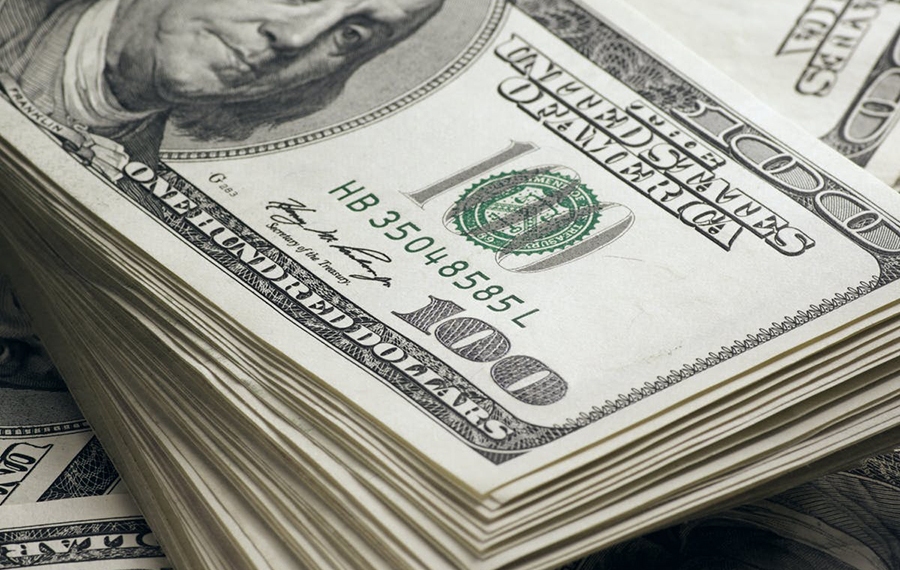(Reuters) – The dollar rose on Wednesday ahead of the conclusion of a Federal Reserve policy meeting that could offer some insight into when the U.S. central bank will begin lowering interest rates.
Sterling was among the weakest performers on the day, after data showed the UK economy contracted in October, raising the risk of a recession and potentially complicating the efforts of the Bank of England (BoE) to stick to its stance against cutting rates when it meets on Thursday.
The U.S. dollar index, which gauges the performance of the currency against six others, rose 0.2% to 103.94 as of 0540 GMT, recouping most of the previous day’s 0.31% drop.
Fed officials will give updated economic and interest rate projections later in the day following a meeting where analysts and investors expect rates to remain unchanged.
In particular, investors will be watching to see if Fed Chair Jerome Powell pushes back against the prospect of interest rate cuts in the first half of 2024, but also what the central bank’s so-called “dot plot” says about policymakers’ thinking regarding the outlook for monetary policy.
Recent signs have pointed to a soft landing but data overnight showed consumer prices unexpectedly rising in November. The futures market shows traders currently expect as many as four quarter-point rate cuts next year, with the first one coming as early as May.
The dot plot could prove more instrumental in setting market expectations than even Powell’s comments, OANDA strategist Craig Erlam said.
“We cannot expect the Fed to align its message with what markets are currently pricing,” he said.
“It doesn’t mean we’ll see aggressive push-back, as we have before, but obviously, it’s all in the dot-plot at this point. It’s almost irrelevant what (Powell) says if the dot plot is pricing in four rate cuts next year.”
James Kniveton, senior corporate FX dealer at Convera, reiterated the Fed’s insistence that it is data dependent, but the market “is already acting like rate cuts are baked in.
“If the Fed does push back tonight on those rate cut expectations, the dollar index may have an opportunity move back into the October range of 105-107,” he said.
The European Central Bank, the BoE, the Norges Bank and the Swiss National Bank meet on Thursday. The Norwegian central bank is considered to be the only one that could potentially raise rates. There is also a risk the SNB could dial back its support for the franc in currency markets.
The Bank of Japan (BOJ) meets next week, and the yen has been volatile on speculation the central bank is drawing close to ending its negative rate policy. Rising hopes this may occur next Tuesday were dashed after Bloomberg reported this week that BOJ officials see little need to rush to the exit.
“If history is any guide, USD/JPY will trade heavily into next week’s BoJ and regardless whether there is a (policy) tweak, USD/JPY will likely rebound in the wake of their meeting,” Richard Franulovich, head of FX strategy at Westpac, wrote in a client note.
“Markets have been underwhelmed with every policy tweak and (BOJ Governor Kazuo) Ueda has dressed up each adjustment in a dovish narrative.”
The dollar rose 0.1% to 145.61 yen, following a 0.5% decline in the previous session. It was a touch stronger against the euro at $1.0783, and up 0.3% against the pound, which traded at $1.2525.
The New Zealand dollar slid 0.6% to $0.6096, having touched its lowest since Nov. 28 earlier after softer-than-expected inflation data suggested its central bank may not have to follow up on its threat to hike rates.
China’s yuan held steady after an agenda-setting meeting of the country’s top leaders failed to deliver strong stimulus measures to shore up economic growth.
The yuan was changing hands at 7.1928 per dollar in the offshore market.
Elsewhere, top cryptocurrency bitcoin eased 1% to $41,057, having retreated from Friday’s 20-month high at $44,729.



